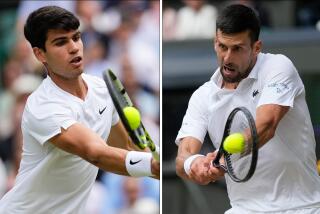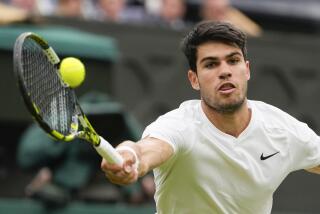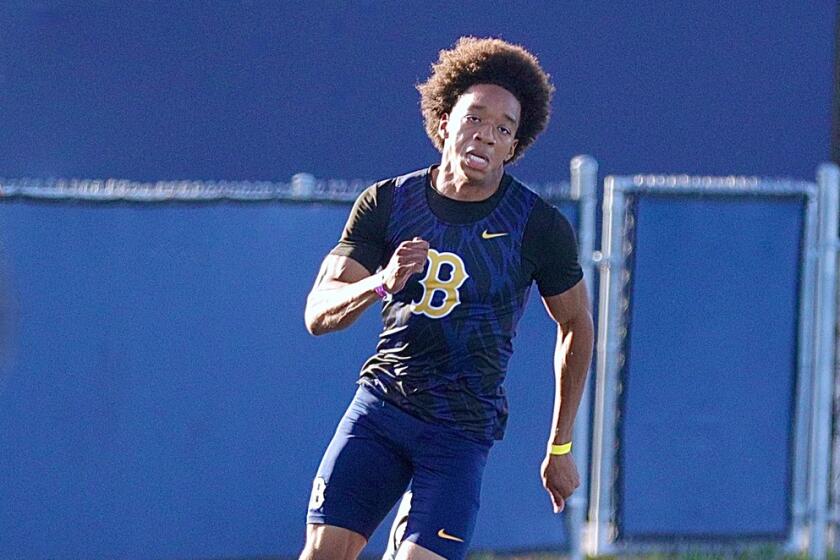Venus Mars It for Serena
- Share via
WIMBLEDON, England — Despite the frenzied tabloid buildup, the sudden influx of celebrity well-wishers and the sports psychodrama, the meeting of sisters Venus and Serena Williams ultimately came down to this:
Their historic Wimbledon semifinal Thursday had all the suspense of a Maleeva match. Which meant the older sister prevailed and, as most Maleeva matches involving Manuela, Katerina and Maggie once did, it ended in tears.
The fifth-seeded Venus defeated eighth-seeded Serena, 6-2, 7-6 (3), winning the final six points of the tiebreaker and advancing to the final against defending champion Lindsay Davenport when Serena double-faulted on match point.
Their father Richard, not in attendance for the sibling semifinal, said he cried. Serena said she hadn’t cried, but her face on the court and teary eyes well afterward suggested otherwise.
Those who watched the 18-year-old reigning U.S. Open champion, who was brilliant in her first five matches, losing only 13 games, question why she suddenly turned pedestrian, failing to return serves of 81 mph, and committing 43 unforced errors.
Had there been, as former Wimbledon champion and BBC commentator Pat Cash wondered, an arrangement for the younger sister to lose to the older sister?
“No, not that I’m aware of,” Venus said.
Richard Williams also pooh-poohed that conspiracy theory, and Davenport thought the sisters were trying their hardest, saying, “No, I don’t think it was fixed at all.”
There are some fairly straightforward reasons for the difference in Serena’s play. She hardly was tested in the early rounds by Asa Carlsson, Yvette Basting and Lisa Raymond. The gulf between their abilities and those of Venus, to put it politely, is vast. Venus, at least, was pushed by Nathalie Dechy and Martina Hingis before facing Serena.
Seventeen-year-old Jelena Dokic of Australia, who lost to Davenport, 6-4, 6-2, in the other semifinal, had the same problem. Dokic hadn’t lost a set, either, against a host of lesser players and then was overwhelmed by Davenport’s powerful serve and forceful ground strokes, holding serve only three times.
This was Serena’s first tournament since early April, because of a knee injury, and her lack of tough match play finally became apparent.
Venus, who sat out about six months because of tendinitis in both wrists, played two events before the French Open.
“She brought out her best game against me today,” said Serena, who was bitterly disappointed, subdued and terse. “I don’t know, I guess I wasn’t that ready. I never said that I was not prepared in the beginning. I said I wasn’t prepared for Venus to play that hard. She usually doesn’t play that well.”
On the big points, Venus was composed. She converted four of five break-point opportunities, whereas Serena was two for 11.
After a subdued 31-minute first set, the pace quickened. Serena recorded an early break and had three chances to take a 5-2 lead in the second on Venus’ serve but hit a forehand long, a backhand return into the net and forehand return into the net.
The failure to convert the three points seemed to take the life out of Serena, who lost 11 consecutive points. The 4-2 lead for Serena quickly turned into a 5-4 lead for Venus.
They stayed on serve until the tiebreaker. Serena led, 3-1, before Venus shifted into a higher gear, winning the final six points.
When Serena double-faulted on match point, the ending seemed almost premature. She stood in disbelief and was comforted by her older sister, who said, “Let’s go, Serena.”
“I don’t think there was any reaction,” Venus said. “I didn’t even get to play the point. You know, it ended so abruptly.”
They walked off the court in their private world, forgetting to curtsy to the royal box, and Venus kindly had helped her younger sister gather her things before leaving Centre Court.
The crowd, which included singers Gladys Knight and Dionne Warwick, and Sarah Ferguson, the Duchess of York, broke out in applause.
Davenport, who will be trying to win her second Grand Slam tournament of 2000, had no problems being the second act or, actually, the undercard.
“Today was pretty exceptional,” said Davenport, who received a bouquet of flowers, tossed on the court after her match. “Two sisters playing in a semifinal. By no means should myself playing Dokic overshadow that.”
Oddly, she was asked whether her father was at the match. He doesn’t travel to matches outside Southern California, nor does the rest of her family, usually. Davenport did say there was a small possibility her mother, Ann, might be at the Wimbledon final.
There was an increased interest in parental involvement, apparently, after Richard Williams chose not to attend his daughters’ semifinal. About 10 minutes before starting time, he was walking outside Gate 13, heading away from the All England Club. He told three reporters he was planning on walking about 12 miles during the match, showing them his provisions, a large chocolate candy bar and some water.
“I’ve lost about eight, nine pounds, I’ve been walking so much,” he said.
The pressure of watching his daughters play their fifth match against each other was simply too much, he added.
Before Thursday, Venus had won the first three matches and Serena the most recent, the final of the Grand Slam Cup in October.
From their modest beginnings as children in Compton, Venus and Serena have played matches at the Australian Open, the Italian Open, Key Biscayne, Fla., the Grand Slam Cup in Germany and now Wimbledon. Venus reflected on this remarkable journey.
“You know, it’s my life,” she said. “The whole time I’ve had a great time. I’ve had a great life. I haven’t had a lot of problems. Sure, maybe living in Compton isn’t like the most-desired place to live, not in the top 100. But I had a great time. I still miss the ice cream trucks.”
She smiled.
“They had the best ice cream trucks,” Venus said. “Spent all my allowance on the ice cream trucks.”
More to Read
Go beyond the scoreboard
Get the latest on L.A.'s teams in the daily Sports Report newsletter.
You may occasionally receive promotional content from the Los Angeles Times.











